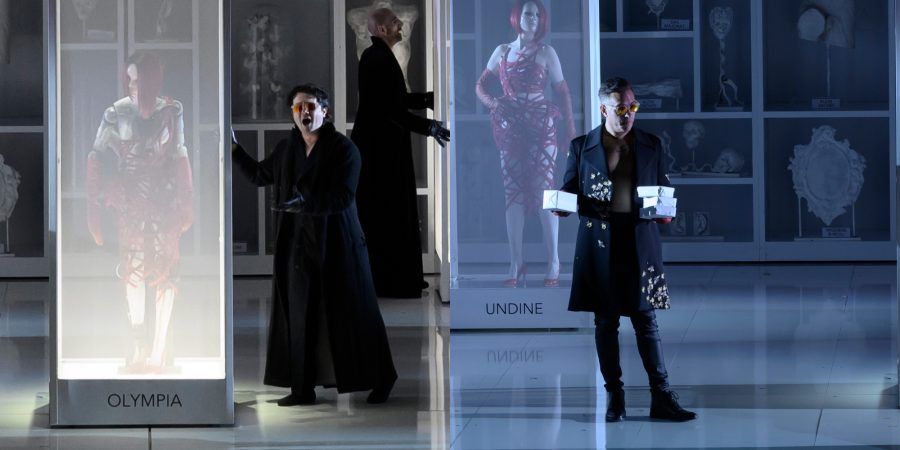Offenbach: Les Contes d'Hoffmann at Opéra Royal de Wallonie-Liège | Live Review
Robert Thicknesse
Monday, January 22, 2024
Stefano Poda's interpretation of Offenbach's final work revealed a brilliantly controlled operatic atmosphere
****
 Jessica Pratt in Offenbach's Le Contes d'Hoffmann | Photo: J Berger
Jessica Pratt in Offenbach's Le Contes d'Hoffmann | Photo: J Berger
Jacques Offenbach’s Hoffmann is an elusive beast, a kaleidoscope of styles and tones that impishly whisks away the carpet just when you think you’ve grasped what the composer is driving at. His sly humour is at work here just as much as in the operettas, though deployed slightly differently, and their pastiche turns (I think) to a sort of hommage to everyone who ever wrote a Romantic opera, with Weberian horns alongside Tchaikovsky dances and a Wagner fanfare. What are we to make of it all? The whimsical text doesn’t give us much help: the various scenes touch on matter of considerable interest (the nature of inspiration, the fatal monomania of art, the frenzy of love) before flitting off again to an entirely different place.
Well, opera’s strong suit has never been an in-depth examination of anything in particular, and this magpie-ish quality of Hoffmann’s, alongside Offenbach’s shuffle-and-deal mashup of musical styles, is its unique and greatest attraction – in terms of delight in sheer musical variety it is surely one of the greatest pieces (and one of the most delightful), for those of us who like it. And as a director, you can do almost anything you like with it, so long as you bring fantasy and imagination.
The strongest point of Stefano Poda’s conception – taking on lights, costumes and design as well as directing – was decorative, presenting the piece literally as a Wunderkammer, the inside of Hoffman’s head also rather a good metaphor for the opera itself, with its mixture of German gothic, ooh-la-la operetta, grand romantic opera and more. In this big space, framed by stage-to-proscenium shelves of plaster horses’ heads, Hellenic torsoes, skeletons, weird plants, the dramas of Hoffman’s loves played out – in what turned out to be remarkably similar ways. In the middle of all this, Hoffmann’s bare room appeared, spinning around like a tumble dryer (with him in it, alarmingly). Actually, despite looking great, the staging had very little dramatic insight, next to no humour and not much of the personal direction that creates character; but it was hard to mind too much. It felt genuinely operatic – particularly perhaps to eyes used to the cheapskate design of most UK opera – and left all the room in the world for music and singing to do what they do, in a space of brilliantly controlled atmosphere.
 Arturo Chacón-Cruz and Erwin Schrott in Les Contes d’Hoffmann | Photo: J. Berger
Arturo Chacón-Cruz and Erwin Schrott in Les Contes d’Hoffmann | Photo: J. Berger
It helped a lot that our Hoffmann was the engaging Mexican tenor Artura Chacón-Cruz: open-hearted and impetuous, and a voice of guileless ardour that may not have bothered too much with quieter registers but burst with passion and honesty. The moment when Hoffmann’s old Kleinzach recitation turned to memories of love was the key to how this performance worked: everything was transformed in a blink, texture, sound, atmosphere, and we were away into musical wonder and the thrills of those upward-modulating sequences Offenbach loved – cheesy, no doubt, but completely compelling when done with this kind of belief and power. That’s what Hoffmann does, but it takes a conductor and singers to make it work: a wind blows in from somewhere else, and the world changes on the instant.
And though this was the most striking hero, it was far from a one-man show, with Jessica Pratt taking the three roles of the doomed girlfriends: a tour-de-force, even if she sounded as if she was saving the voice at times. She has the lightest and clearest (and highest) coloratura, though a few of the other notes are less certain, and despite a rather statuesque stage presence she made effective differences between the three, most at home, oddly enough, in the dramatic role of Giulietta. Erwin Schrott’s baddie – Lindorf, and the other nemeses – was fun for a bit, with his Hammer Horror laughs and animal presence, but the cockiness wears thin after a while. Julie Boulianne was the striking and charismatic Niklausse/Muse, egging Hoffmann on to self-destruction for the sake of art.
A big night for the chorus, too, who really made the show’s atmosphere in their various guises – the ladies in particular having a lot of fun with robot-dance moves in the Olympia act, and altogether moving with decorative grace throughout. The staging’s main feature was a bunch of glass display-cases containing female specimens (characters from Hoffmann stories, famous divas, top courtesans), elegantly enacted by dancers, which were wheeled around the stage by a black-clad janitoriat. This yielded diminishing returns, but it was easy on the eye; a lot of non-futile work and money had gone into costumes, and Poda certainly lit his creations brilliantly. Conductor Giampaolo Bisanti, the Liège Opera’s music director, led an admirable performance: lacking a bit of fantasy and lightness, and those oboes in the barcarolle were way too prominent, but with a great feeling for the chameleon nature of the score, a lot of oomph in the orchestral music and – most importantly – a great support for the singers.
Some editions of Hoffmann can peter out, but not here: the Giulietta act ratcheted up to a massive climax of impassioned duets, and the epilogue (despite some iffy dramaturgy reconciling Hoffmann and Lindorf in heavenly harmony) grew to a thunderous conclusion, even if the last chorus ('suffering makes you stronger!') sounds a bit close to contemporary fake positivism. In the end the secrets of this opera are revealed almost entirely through the music – something this stirring performance proved with some style.






